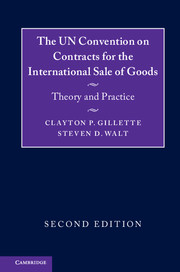Book contents
- Frontmatter
- Contents
- Preface
- 1 The CISG: history, methodology, and construction
- 2 The scope of the CISG
- 3 Contract formation
- 4 Implied terms and interpretation
- 5 Performance
- 6 Liability for nonconformity
- 7 Risk of loss
- 8 Exemption from performance
- 9 Remedies
- Appendix 1 The United Nations Convention on Contracts for the International Sale of Goods
- Appendix 2 CISG status table
- Table of cases
- Subject matter index
3 - Contract formation
Published online by Cambridge University Press: 05 June 2016
- Frontmatter
- Contents
- Preface
- 1 The CISG: history, methodology, and construction
- 2 The scope of the CISG
- 3 Contract formation
- 4 Implied terms and interpretation
- 5 Performance
- 6 Liability for nonconformity
- 7 Risk of loss
- 8 Exemption from performance
- 9 Remedies
- Appendix 1 The United Nations Convention on Contracts for the International Sale of Goods
- Appendix 2 CISG status table
- Table of cases
- Subject matter index
Summary
STATUTE OF FRAUDS AND ARTICLE 12
The CISG affirmatively rejects any statute of frauds or other formality for the creation of a contract. Article 11 recites that “[a] contract of sale need not be concluded in or evidenced by writing and is not subject to any other requirement as to form. It may be proved by any means, including witnesses.” In this sense, the CISG recognizes commercial practices in which parties enter binding agreements through handshakes, conduct, or simply oral understandings. Article 11 eliminates any domestic requirements not only that the contract be in writing, but also that it be evidenced by seals, notarization, or other formalities. The assertion that a contract may be proven by any means implies the absence of any parol evidence rule, a subject that we discuss in the next chapter. Of course, in accordance with the “party autonomy” principle of Article 6, parties may deviate from these rules. An offer may, for instance, require that any acceptance be in writing, and a completed contract may be governed by a “no oral modification” clause. The effectiveness of such restrictions raises issues of validity, and thus, to the extent that they are not addressed by the CISG, Article 4(a) dictates that they be governed by domestic law.
The absence of formal requirements for contract formation is a common phenomenon of civil law. But it is less frequent in common law and Scandinavian jurisdictions, and in the countries formerly within the Soviet Union. As a consequence, Article 11 was quite controversial during the drafting of the CISG. The ultimate compromise was to permit (in Article 96) Contracting States that had domestic requirements for contracts of sale to be concluded or evidenced in writing to declare that the CISG articles rendering writings unnecessary are inapplicable where any party to the contract has its place of business in one of those States. The declaration nullifies the effect of Article 11 (and of Article 29, dealing with modification or Part II of the CISG). Article 12 makes such a declaration effective by stating that Article 11 is inapplicable where any party has its place of business in a Contracting State that has made an Article 96 declaration. To date, Argentina, Armenia, Belarus, Chile, Paraguay, Russian Federation, and Ukraine have made Article 96 reservations.
- Type
- Chapter
- Information
- The UN Convention on Contracts for the International Sale of GoodsTheory and Practice, pp. 83 - 118Publisher: Cambridge University PressPrint publication year: 2016



